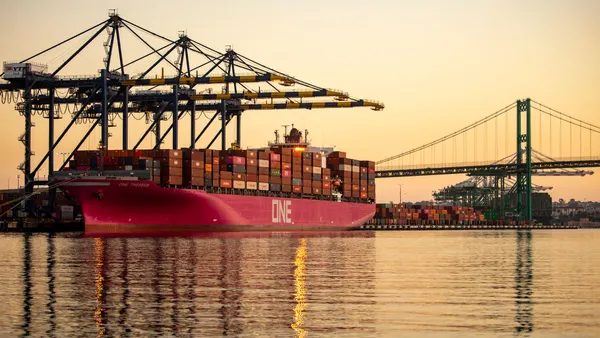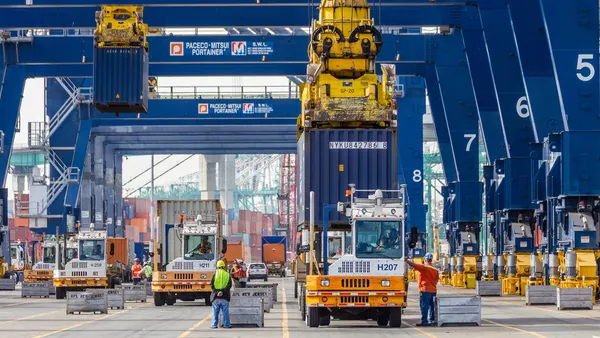This story is part of a series on the trends that will shape supply chains in 2021 and beyond. You can find all the articles on our trendline.
The supply chain landscape began the year absent of a familiar name. Damco is no more, after Maersk announced in September it would dissolve the freight forwarder brand by the end of 2020. Maersk absorbed Damco's air and ocean less-than-container-load shipping to combine it with Maersk’s logistics and services products.
The Copenhagen-based conglomerate's portfolio now boasts air forwarding and LCL in addition to existing services in ocean transport, trucking, customs brokerage, warehousing and port terminals.
Alexander Nowroth, managing partner at Lebenswerk Consulting Group, compared it to the Amazon effect.
"Amazon wants to control everything up to the last mile. And the same thing is now happening with container lines," he said.
Maersk CEO Søren Skou has pursued an end-to-end logistics strategy for years, acquiring customs brokers, investing in digital tools like Loadsmart and developing platforms such as Maersk Flow and Twill. Maersk marketed the internalization of Damco services using words such as "simplified," "agile," "seamless" and with fewer "handoffs."
Andrew Sisto, director of corporate development at project44 and former manager at Maersk, described the internalization of Damco as "a natural fit."

The Damco move further blurs the lines between forwarder and carrier.
"It's very hard for shippers, and also forwarders, to differentiate," said Nowroth, who formerly held roles at DB Schenker and Maersk. "Am I dealing now with a freight forwarder? Or am I dealing with a shipping company?"
Shippers face a choice as they plan their freight strategies: the simplicity of a single end-to-end provider versus the reduced risk of a diversified carrier network.
"Shippers can take a call on what sort of service they want and whether they might be willing to pay extra for an end-to-end service from a single provider," said Chris Rogers, lead supply chain analyst at S&P Global-owned Panjiva in an email.
"Am I dealing now with a freight forwarder? Or am I dealing with a shipping company?"

Alexander Nowroth
Managing Partner at Lebenswerk Consulting Group
Many large businesses already work directly with container lines, so there may be little change to their relationship with Maersk, if any. Firms that ship several thousand containers each year likely already have what Nowroth called a "healthy mix" of freight suppliers.
Mid-sized shippers may find themselves more in a decision-making spot. No doubt Maersk, as the largest container line in the world, has expertise that could aid shippers, particularly smaller ones.
"We can bundle products into customized solutions and also offer visibility and reliability that help our customers make their daily jobs easier, solve their supply chain challenges, and help them win in their markets," Michael Meierkort, head of logistics and services for Maersk North America, said in an email.
Working directly with a carrier such as Maersk typically means preferred (though not always guaranteed) vessel space — a critical factor in the current environment of limited capacity and lofty freight rates.
For a supply chain manager in need of reliability and stability rather than the lowest cost, Nowroth recommended direct bookings with a carrier. "Maersk can definitely get you space if you pay money for it," he said, adding that the carrier is known for a high quality of service.
"The disadvantage is [shippers] only have one ocean freight service," Nowroth said, as opposed to a freight forwarder that will book with more than one shipping line.
Multiple carrier options hedge shippers against risks, whether that's a force majeure declaration, a blank sailing and rolled shipment, or a cyberattack that disrupts communications or operations.
"The spate of cyber-attacks ... [shows] the importance to shippers of maintaining a diverse set of shipping options even if that comes at the expense of efficiency and costs," Rogers said.
Freight forwarders: Friend or foe?
The scrapping of Damco also leaves freight forwarders at a crossroads. Maersk, once and still a supplier, now offers many of the same services as freight forwarders.
"Forwarders definitely see this as competition," Rogers said.
After Maersk announced the Damco move Sept. 1, DB Schenker wasted no time swooping in to grab Damco customers who would have been transferred over to Maersk. On Sept. 4, DB Schenker announced a "stability package" for Damco customers, in which DB Schenker would provide short-term services agreements with the same conditions shippers had working with Damco.
"As you can imagine, Maersk was very furious about that," Nowroth said. The carrier terminated rates and agreements with the forwarder, according to Nowroth and media reports. ShippingWatch later reported the forwarder had moved its business from Maersk to MSC. DB Schenker did not respond to a request for comment.
On Maersk's Q3 earnings call in November 2019, an analyst asked about volumes and market share with freight forwarders, mentioning the media reports about DB Schenker.
"I think all we can say is that, as any other business, you win a customer every now and then, and you lose a customer every now and then," Skou said in response, without naming DB Schenker. "And so we are very comfortable with our position with our freight forwarder customers."
Maersk is the largest container line with 17% market share
The critical dynamic as Maersk integrates Damco services is maintaining a level playing field, said Dr. Stéphane Graber, director general of FIATA, the International Federation of Freight Forwarders Associations.
"The maritime supply chain has undergone a number of structural changes over the years, and all actors have had to adapt and make commercial decisions in line with the new business realities," Graber said in an email.
Even if freight forwarders choose to treat Maersk as competition, they have to consider availability of assets to provide their shipper customers.
"Most of the forwarders are alive to the fact that they cannot avoid using Maersk as a carrier especially when they have huge market shares in many trade lanes," said Hariesh Manaadiar, author of Shipping and Freight Resource.
Maersk has a capacity of 4.1 million TEUs and holds 17% of the container shipping market, according to Alphaliner. Its alliance partner MSC ranks second in Alphaliner's Top 100, holding nearly 16% market share with 3.9 million TEUs. A freight forwarder avoiding bookings with either or both carriers significantly shrinks the pool of available capacity.
"Most of the forwarders are alive to the fact that they cannot avoid using Maersk as a carrier."

Hariesh Manaadiar
Author of Shipping and Freight Resource
"Kuehne + Nagel doesn't have their own ships. And that means they can't really do anything in the freight forwarding service without Maersk," Nowroth gave as an example. Kuehne + Nagel declined to comment on whether it views Maersk as competition, a partner or both. FIATA said it was not in a position to comment on hows its members perceive Maersk.
"Freight forwarders will continue to be a key customer segment for our ocean business," Meierkort said.
Forwarders working with Maersk but concerned about competition may choose to issue house bills of lading rather than use master bills of lading issued by the carriers, to protect shipper details from Maersk, Manaadiar said.
Forwarding's shifting sands
Analysts said the Maersk-Damco move will start to drive a number of changes among freight forwarders and how they market themselves to shippers.
"They have to justify their existence," said Nowroth. "They have to be far more innovative, they have to be far more clever, about what they can really offer as a value to their own customers."
One way to do so is to emphasize to shippers "the importance of having a diverse set of logistics options open," Rogers said.
Forwarders will have to invest further in digital transformation to compete with carriers' offerings. Forwarders typically have the upper hand over shipping lines on tracking services and customs clearance, Nowroth said, which they can bill as a value-add.
"They have to justify their existence."

Alexander Nowroth
Managing Partner at Lebenswerk Consulting Group
The Maersk move may also spark a spate of M&A activity as forwarders aim to demonstrate value to shippers through size and purchasing power.
"If you don't have hundreds of thousands or millions of TEUs ... you're not really a serious negotiation partner with shipping lines," Nowroth said.
Size was among the reasons DSV bought Panalpina for $4.6 billion in 2019. The acquisition made DSV Panalpina the fourth-largest freight forwarding firm globally, according to Armstrong & Associates.
Analysts have speculated that freight forwarding firms would buy each other due to the highly fragmented market.
"I see Agility buying something within the next couple of years," Cathy Morrow Roberson, founder of Logistics Trends & Insights, told Supply Chain Dive in 2019. Agility was in merger talks with Panalpina before the DSV acquisition.
Top global freight forwarders
In the wake of Maersk's Damco move, Nowroth floated what he said was a "cool, radical idea:" that a freight forwarder might buy a shipping line. But he acknowledged that's a big undertaking from a capital investment standpoint due to the high costs of operating and maintaining vessels.
Carriers are unlikely to buy other carriers, as the industry has undergone a wave of consolidation and the top 10 control nearly 84% of the market. But they'll likely make moves to go deeper into forwarding, logistics and end-to-end services, analysts predicted.
The most comparable example so far is CMA CGM's acquisition of Ceva Logistics, though there are key differences. CMA CGM hasn't restructured its business in the same aggressive manner as Maersk. Ceva is also more of a standalone operation, at least for now.
"Maersk traditionally has a pull effect," Nowroth said. "Whatever they do first, others naturally try and imitate that."













